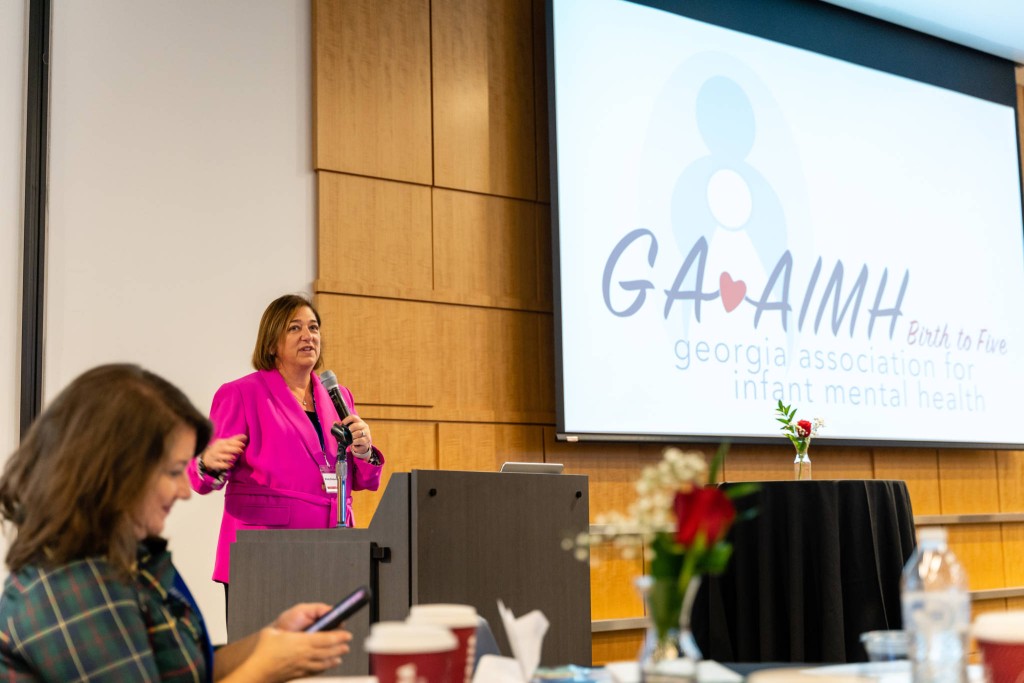A New Day in Georgia for Infant and Early Childhood Mental Health

By: GEEARS for Saporta Report
These days, the topic of mental health seems to be everywhere. In the wake of the pandemic, medical practitioners, educators, and government leaders are all freshly aware of mental health challenges and the imperative that we incorporate their treatment into everyday healthcare.
Yet, the public still has some catching up to do when it comes to understanding infant and toddler mental health needs. A growing body of research indicates that babies do have mental health—and it’s a critical springboard into a life of well-being.
That’s why GEEARS is thrilled to have been a primary partner in the formation of the Georgia Association for Infant Mental Health (GA-AIMH). The association has several goals, including raising awareness of young children’s social and emotional needs, developing and supporting the state’s IECMH workforce, and fostering cross-system collaboration.
GA-AIMH was founded after a two-year-long series of conversations, collaborations, and recommendations within the Infant and Early Childhood Mental Health Committee of GEEARS’ Georgia Infant-Toddler Coalition. Throughout the year, an exploratory board that included GEEARS’ Senior Health Policy Manager, Callan Wells, labored to define the vision, mission, values, and goals of GA-AIMH and to find a home for the association at Georgia State University’s Mark Chaffin Center for Healthy Development (MCCHD).
GA-AIMH is now up and running, offering training for behavioral health clinicians in Child-Parent Psychotherapy (CPP).
The association celebrated its launch at a luncheon on November 2nd at the Georgia State College of Law. At the lectern at the jubilant event were speakers that included GEEARS Executive Director, Mindy Binderman and Commissioner of the Georgia Department of Early Care and Learning, Amy M. Jacobs.
“According to the National Institutes of Health,” Jacobs told the group, “nine to 14 percent of children ages zero to five experience emotional or behavioral disturbances, which is the same rate as school-age children. Mental health starts from the very beginning and we need a system in Georgia to better support the mental health of young children and their caregivers.”
“A lot of folks who came to the launch expressed gratitude,” Wells observed afterwards. She noted that the 150 attendees came from all over Georgia and represented a range of professions, from mental health clinicians to professionals at state agencies, from advocates to child care providers. “They’ve been waiting for this. They’ve had kids who are experiencing trauma and they’ve had nowhere to refer them. Having this training hub—a professional home for people who want to support young children in this way—is something they’ve really been needing.”
Indeed, many in the luncheon reported that the room was practically “vibrating” with hopeful energy.
We think a similar optimism—and a great mini-education about IECMH—can be found in the video below. In it, you’ll hear about the policy advances that GEEARS and its partners have achieved on behalf of Georgia’s youngest children. You’ll also learn what you can do to support GA-AIMH along with GEEARS, which continues to be a GA-AIMH partner and an advocate for IECMH through the Georgia Infant and Toddler Coalition.
Together, we can help launch the next generation of babies into a healthy and successful future.